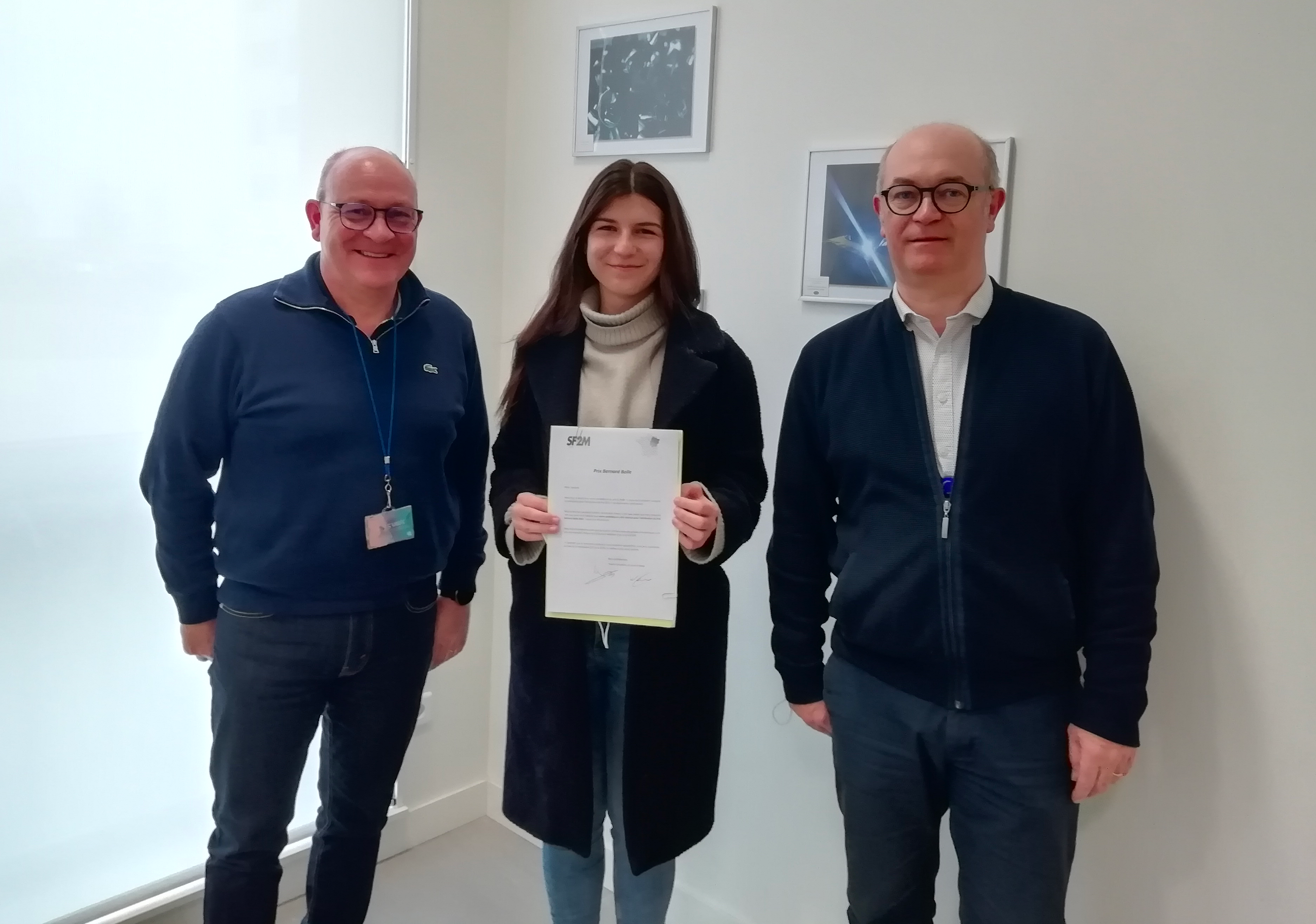Victoire Lescure is the Bernard Bolle prizewinner

Graduated of the master’s degree in chemistry in materials, Victoire Lescure is the winner of the Bernard Bolle Prize 2022 from the Eastern section of the French Society of Metallurgy and Materials (SF2M). This prize was awarded at the Maison de la Métallurgie in Dijon, in the presence of Prof. Gilles Caboche, scientific manager of the work carried out by Victoire, and Prof. Frederic Bernard.

As for my thesis, the subject takes up the continuity of my internship work. I am therefore continuing to optimize the shaping process for these batteries. Here is the title: “Behaviour and durability of proton ceramic electrochemical cells (PCEC) integrated in a stack. »
The objectives thereafter will be to increase the size of the piles, with an aim of industrialization, to create a “stack" (or pile) of piles, to increase the performances and finally, to test what one calls the mode electrolyser. That is to say to operate the battery in the opposite direction, which will therefore allow the formation
d’hydrogène à partir d’eau et d’électricité.
V. LESCURE
The Bernard Bolle Prize of the Grand-Est section of the SF2M (French Society of Metallurgy and Materials) is an award given annually to a student who has completed an excellent internship in Master 2 or at the end of school of Engineer, in the field of R&D in materials. This prize was set up in 2014 by the Grand-Est section of the SF2M.
My internship focused on the production and characterization of proton conduction fuel cell cells. They are called PCFC (for Protonic Ceramic Fuel Cell in English). It is a type of fuel cell that operates between 400°C and 600°C, which is lower than other types of cells for the same applications (which are in the stationary, that is- i.e. heating a house, or for commercial shipping, etc.). A fuel cell converts chemical energy into electricity. They run on a fuel like hydrogen.
During this internship, I worked on shaping these batteries. Being made up of three layers (anode, electrolyte and cathode), I worked on the succession of three shaping methods for each respective layer: tape-casting, PVD then spray-coating. Once made, I was also able to test their performance, notably at the DICCA laboratory in Genoa, Italy, where I stayed for a month.
.
- kc_data:
- a:8:{i:0;s:0:"";s:4:"mode";s:2:"kc";s:3:"css";s:0:"";s:9:"max_width";s:0:"";s:7:"classes";s:0:"";s:9:"thumbnail";s:0:"";s:9:"collapsed";s:0:"";s:9:"optimized";s:0:"";}
- kc_raw_content:
- [kc_row use_container="yes" _id="748871"][kc_column width="12/12" video_mute="no" _id="98887"][kc_column_text _id="736474"]
Graduated of the master's degree in chemistry in materials, Victoire Lescure is the winner of the Bernard Bolle Prize 2022 from the Eastern section of the French Society of Metallurgy and Materials (SF2M). This prize was awarded at the Maison de la Métallurgie in Dijon, in the presence of Prof. Gilles Caboche, scientific manager of the work carried out by Victoire, and Prof. Frederic Bernard.
[/kc_column_text][kc_spacing height="30px" _id="126065"][/kc_column][/kc_row][kc_row use_container="yes" _id="539017"][kc_column width="50%" _id="285699"][kc_single_image image_size="full" _id="288251" image_source="media_library" image="24431"][kc_spacing height="5px" _id="541174"][kc_column_text _id="727929"]
[/kc_column_text][kc_spacing height="2px" _id="101632"][kc_column_text _id="220988"]As for my thesis, the subject takes up the continuity of my internship work. I am therefore continuing to optimize the shaping process for these batteries. Here is the title: “Behaviour and durability of proton ceramic electrochemical cells (PCEC) integrated in a stack. »
The objectives thereafter will be to increase the size of the piles, with an aim of industrialization, to create a "stack" (or pile) of piles, to increase the performances and finally, to test what one calls the mode electrolyser. That is to say to operate the battery in the opposite direction, which will therefore allow the formation
d’hydrogène à partir d’eau et d’électricité.
V. LESCURE
[/kc_column_text][/kc_column][kc_column width="5%" _id="94554"][/kc_column][kc_column width="45%" _id="767853"][kc_column_text _id="108930"]The Bernard Bolle Prize of the Grand-Est section of the SF2M (French Society of Metallurgy and Materials) is an award given annually to a student who has completed an excellent internship in Master 2 or at the end of school of Engineer, in the field of R&D in materials. This prize was set up in 2014 by the Grand-Est section of the SF2M.
[/kc_column_text][kc_spacing height="10px" _id="686138"][kc_column_text _id="970658"]
[/kc_column_text][/kc_column][/kc_row]My internship focused on the production and characterization of proton conduction fuel cell cells. They are called PCFC (for Protonic Ceramic Fuel Cell in English). It is a type of fuel cell that operates between 400°C and 600°C, which is lower than other types of cells for the same applications (which are in the stationary, that is- i.e. heating a house, or for commercial shipping, etc.). A fuel cell converts chemical energy into electricity. They run on a fuel like hydrogen.
During this internship, I worked on shaping these batteries. Being made up of three layers (anode, electrolyte and cathode), I worked on the succession of three shaping methods for each respective layer: tape-casting, PVD then spray-coating. Once made, I was also able to test their performance, notably at the DICCA laboratory in Genoa, Italy, where I stayed for a month.
.
